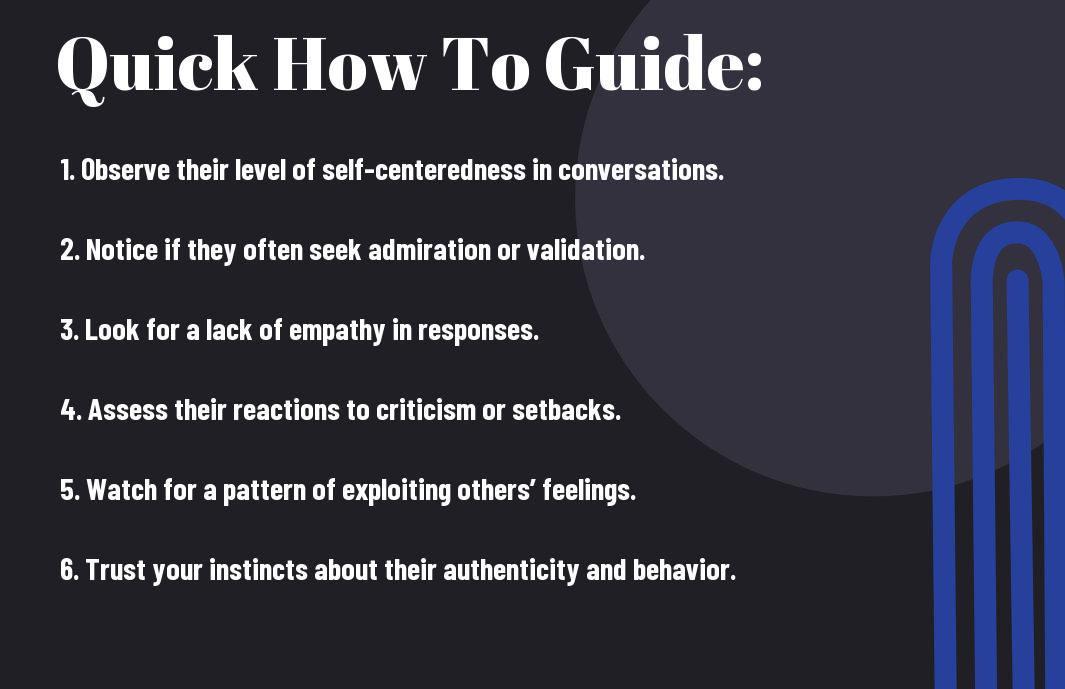You are entering the dating world, and it’s necessary to recognize potential red flags, particularly when it comes to narcissistic personalities. These individuals can be charming and charismatic initially, but their self-centered behaviors can lead to toxic relationships. In this guide, you’ll learn to identify the signs of a narcissist, ensuring you make informed choices in your dating life. By understanding their patterns and traits, you can safeguard your emotional well-being and foster healthier connections.
Understanding Narcissism
Your ability to identify narcissism in a potential partner can significantly impact your dating experiences. Narcissism is a personality trait characterized by an inflated sense of self-importance, a deep need for admiration, and a lack of empathy for others. Understanding narcissism can empower you to make informed decisions about your relationships, safeguarding your emotional well-being and ensuring you cultivate connections based on mutual respect and care.
Defining Narcissism
Some psychologists define narcissism as a pattern of grandiosity, an excessive need for admiration, and a deep-seated lack of empathy. It manifests in different forms, including overt narcissism, where individuals display confidence and seek attention, and covert narcissism, where individuals may appear shy but still harbor inflated self-views. Being aware of these definitions will help you spot narcissistic behaviors early in your dating journey.
Common Traits of Narcissists
Assuming you encounter someone displaying narcissistic tendencies while dating, there are several traits to be on the lookout for. These may include an exaggerated sense of self-importance, a constant need for validation, and a lack of genuine interest in others’ feelings. Narcissists often monopolize conversations, show impatience when they aren’t the center of attention, and may react poorly to criticism or challenges to their self-image.
Traits commonly observed in narcissists can create significant challenges in a relationship. They may require constant praise, feel entitled to special treatment, and display arrogance or disdain towards those they perceive as inferior. Additionally, narcissists often struggle to maintain healthy relationships due to their inability to empathize with others. As you navigate the dating landscape, recognizing these traits can be imperative in spotting potential red flags and ensuring you prioritize your emotional health.

How to Spot a Narcissist While Dating
Any time you begin dating someone new, it’s vital to be aware of the signs that may indicate narcissistic tendencies. These traits can be subtle at first but can ultimately affect your emotional well-being. By recognizing these characteristics early, you can protect yourself from potential turmoil down the line.
Red Flags in Communication
Some red flags in communication may include a lack of empathy, constant self-referential stories, and an overabundance of compliments that feel insincere. Pay attention to how your partner discusses others and whether they exhibit genuine interest in your thoughts and feelings. If conversations center around them with little room for your input, this could be a warning sign.
Behavioral Indicators to Watch For
To effectively identify a potential narcissist, observe their behavioral patterns during your interactions. Look for signs such as a need for excessive admiration, difficulty accepting criticism, or a tendency to belittle others.
Communication is key in recognizing these behavioral indicators. Narcissists often engage in one-sided conversations, showcasing their accomplishments while glossing over yours. If you find that your partner frequently shifts the dialogue back to themselves or reacts dismissively to your achievements, this may indicate a deeper issue. Trust your instincts and consider how their behavior makes you feel; if it’s more draining than uplifting, it might be time to reevaluate the relationship.

Tips for Evaluating Your Partner
Unlike typical relationships, identifying a narcissist while dating requires keen observation and evaluation of your partner’s behavior. Consider the following tips:
- Pay attention to how they talk about themselves.
- Notice their reactions to criticism or setbacks.
- Observe how they treat waitstaff or service workers.
- Assess their ability to empathize with others.
The insights you gather can provide important clues about their true character.
Importance of Consistency
To effectively evaluate your partner, it’s imperative to look for consistency in their words and actions. If they frequently shift their opinions or behave differently in various situations, it may indicate a lack of stability that is often associated with narcissistic tendencies.
Seeking Feedback from Friends
To gain perspective on your partner’s behavior, consider seeking feedback from friends who know you well. They can offer valuable insights that you might overlook, especially if you’re emotionally invested in the relationship.
Consistency among your friends’ feedback can highlight patterns of red flags you may not notice yourself. Trust their observations about your partner’s behavior, and weigh their opinions alongside your experiences. Having an external viewpoint can assist you in forming a more balanced perspective on any problematic traits. Doing this helps ensure that you are not blinded by the initial attraction and can protect your emotional well-being.
Emotional Manipulation Tactics
Once again, you should be vigilant for red flags indicating emotional manipulation in your dating experience. Narcissists often use tactics to undermine your confidence and sway your emotions in their favor. They might twist situations to portray themselves as the victim, leading you to question your own perceptions and judgments. Being aware of these methods can help you safeguard your emotional well-being and make informed decisions in your relationship.
Gaslighting Techniques
You may find yourself feeling confused or anxious if your partner frequently dismisses your feelings or contradicts your version of events. Gaslighting techniques involve making you doubt your reality, often leading you to second-guess your thoughts and emotions. This manipulation can create a dependency on the narcissist for validation, leaving you feeling isolated and unsure of yourself.
Love Bombing
Assuming that someone is genuinely interested in you, be cautious if you experience an overwhelming amount of affection and attention early in the relationship. Love bombing involves excessive flattery, gifts, and attention designed to manipulate your emotions and create dependency. This tactic can sweep you off your feet, giving you a false sense of security before the relationship takes a darker turn.
A love bomber’s intent is to accelerate emotional intimacy, making you feel cherished and wanted, but this can be misleading. The initial onslaught of affection may fade, revealing the narcissist’s true nature as they withdraw love or become critical. This push-pull dynamic can leave you feeling emotionally drained and confused, as you grapple with the disparity between their initial behavior and their later actions. It’s necessary to remain aware of these patterns to protect yourself from long-term emotional harm.
Factors that Indicate a Partner’s Narcissism
To identify a partner’s narcissistic traits, observe the following behaviors:
- Excessive self-importance and bragging
- Lack of empathy towards others’ feelings
- Need for constant admiration and validation
- Manipulative or controlling behavior
- Difficulty accepting criticism or rejection
Any of these traits might suggest a deeper issue. For more insights, check out How To Spot A Narcissist On A First Date. | by Katia Beeden.
History of Relationship Patterns
Now, take a closer look at your partner’s past relationships. A pattern of turbulent relationships often indicates an underlying narcissistic tendency. Frequent breakups or conflicts without resolution could signal that their behavior contributes to relationship instability.
Response to Conflict
Some individuals with narcissistic traits tend to react negatively during conflict situations. They may become defensive or lash out instead of engaging in healthy discussions.
Understanding how your partner handles disagreements can provide significant insight. A narcissistic partner might resort to blame-shifting, stonewalling, or utilizing guilt to manipulate the situation. These responses, rather than constructive dialogue, are red flags of narcissism.
Navigating a Relationship with a Narcissist
For those entangled in a relationship with a narcissist, it can be challenging to maintain your sense of self. Understanding their behaviors, emotional manipulation tactics, and maintaining your boundaries are key to navigating this complex dynamic. Focus on preserving your emotional well-being, and remain aware of your needs. Prioritize self-care, communication, and support from your loved ones while you assess your relationship’s health.
Setting Boundaries
On establishing your personal boundaries is important when dealing with a narcissist. Be clear about what behaviors you will and will not accept, and communicate these limits consistently. Set firm consequences for when these boundaries are violated, and stick to them. This will help you protect your emotional space, and reduce the likelihood of manipulation or guilt trips.
When to Seek Help
You may find that navigating your relationship with a narcissist is overwhelming at times. If the emotional toll begins to affect your mental health, it is important to consider seeking professional help. A therapist can provide you with coping strategies, validation, and new perspectives, empowering you to make informed decisions about your relationship.
Seek support from a mental health professional if you ever feel trapped, demoralized, or anxious in your relationship. It’s normal to experience emotional distress when dealing with a narcissist, and therapy can help you reclaim your sense of self. You may also benefit from joining a support group where others share similar experiences, offering you insights and encouragement as you navigate this difficult terrain.
Conclusion
Drawing together the insights on how to spot a narcissist while dating, it’s vital that you pay attention to patterns of behavior, especially those that suggest a lack of empathy or a constant need for validation. Look for signs such as excessive talk about themselves, dismissive reactions to your needs, and their tendency to manipulate situations to their advantage. Trust your instincts and take note of how you feel in their presence; your emotional well-being is paramount as you navigate the complexities of relationships.










